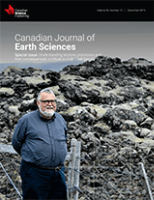
CANADIAN JOURNAL OF EARTH SCIENCES
Scope & Guideline
Championing Quality Research in Geosciences
Introduction
Aims and Scopes
- Geological Processes and Tectonics:
Research focusing on the structural and tectonic evolution of various geological formations, including insights into orogenies, fault systems, and metamorphic processes. - Geochronology and Petrogenesis:
Studies that utilize dating techniques and geochemical analyses to understand the origins, compositions, and evolution of rocks and mineral deposits. - Paleobiology and Fossil Record:
Investigations into the fossil record, including the biostratigraphy and paleoecology of ancient organisms, aiming to enhance our understanding of biodiversity through time. - Environmental and Coastal Geology:
Research addressing geological aspects of environmental change, including coastal processes, sedimentology, and natural hazards. - Climatic and Glacial Studies:
Explorations into the effects of glaciation and climate change on geological formations and sediment transport systems. - Mineral Resources and Economic Geology:
Studies focused on the formation, exploration, and economic significance of mineral deposits, including assessments of their geodynamic settings.
Trending and Emerging
- Climate Change and Geological Impact:
Research examining the geological consequences of climate change, including sediment transport and coastal erosion, is becoming increasingly relevant as environmental concerns gain prominence. - Indigenous Knowledge and Geoscience:
There is a growing integration of Indigenous perspectives and traditional ecological knowledge in geological studies, highlighting the value of these insights in understanding geological processes and resource management. - Geohazards and Risk Assessment:
Studies focusing on geohazards, including landslides, earthquakes, and volcanic activity, are trending as societies seek better understanding and preparedness for natural disasters. - Advanced Geochemical Techniques:
The application of sophisticated geochemical methodologies, such as isotopic analysis and trace element geochemistry, is on the rise, enhancing the understanding of geological processes and resource formation. - Hydrogeology and Water Resources:
Research into groundwater systems and water resource management is increasingly prominent, reflecting the critical importance of water sustainability in the context of climate change.
Declining or Waning
- Paleoclimate Studies:
Research on ancient climate conditions has become less frequent, possibly due to a shift towards contemporary climate impact studies or other more pressing environmental issues. - Non-Mineral Resource Geology:
The exploration of geological features unrelated to mineral resources, such as certain sedimentary or volcanic studies, appears to be declining in favor of more economically relevant topics. - Detailed Biostratigraphic Studies:
While biostratigraphy remains important, the highly detailed studies of specific fossil assemblages seem to be overshadowed by broader ecological and evolutionary research themes. - Low-Temperature Geochemistry:
Analyses focusing on low-temperature geochemical processes have diminished, potentially due to a declining interest in these niche areas compared to high-temperature magmatic studies.
Similar Journals
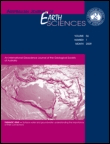
AUSTRALIAN JOURNAL OF EARTH SCIENCES
Elevating Earth Sciences Through Rigorous ResearchAustralian Journal of Earth Sciences, published by Taylor & Francis Ltd, has established itself as a leading journal in the field of Earth and Planetary Sciences since its inception in 1984. With an impactful reach reflected in its ranking as Q2 in the Earth and Planetary Sciences category, the journal contributes significantly to the advancement of knowledge through rigorous peer-reviewed research. While it is not Open Access, the journal ensures broad accessibility through institutional subscriptions and various academic platforms. With a commitment to covering diverse topics within the Earth sciences, including geosciences, geology, and environmental studies, the Australian Journal of Earth Sciences is an essential resource for researchers, professionals, and students seeking to deepen their understanding of the dynamic processes that shape our planet. Engaging with the journal means being part of a vibrant community that aspires to push the boundaries of scientific inquiry and innovation in Earth sciences.

Geologos
Fostering Global Dialogue on Geological WondersGeologos is a peer-reviewed journal dedicated to advancing knowledge in the field of Earth and Planetary Sciences. Published by SCIENDO, this Open Access journal has been facilitating unrestricted access to research findings since 2009, ensuring that scholars, professionals, and students can engage with up-to-date scientific discourse without barriers. With an ISSN of 1426-8981 and an E-ISSN of 2080-6574, Geologos is indexed in Scopus, where it currently holds a rank of #111 out of 195 in the General Earth and Planetary Sciences category, reflecting its commendable impact within the discipline. Based in Poland, the journal embraces contributions from international authors, promoting a diverse and inclusive dialogue on topics ranging from geological phenomena to planetary processes. As a Q3 journal in the Earth and Planetary Sciences category, Geologos is committed to enhancing the understanding and appreciation of the Earth's systems, making it an essential resource for those engaged in research and practice within this dynamic field.

INTERNATIONAL JOURNAL OF EARTH SCIENCES
Bridging Theory and Practice in Earth SciencesINTERNATIONAL JOURNAL OF EARTH SCIENCES, published by Springer, is a leading journal in the field of Earth and Planetary Sciences, distinguished by its Q1 quartile ranking in the 2023 category of Earth and Planetary Sciences (miscellaneous). With an ISSN of 1437-3254 and an E-ISSN of 1437-3262, this journal has been a pivotal platform for researchers, academics, and practitioners since its inception in 1996. The journal's focus encompasses a broad range of topics within Earth sciences, making it a vital resource for contributions that enhance our understanding of geological processes, climate change, and planetary dynamics. The impact factor reflects its high standards and the significance of the research it publishes, ranking it in the 74th percentile among its peers as per Scopus. Furthermore, the journal offers Open Access options, facilitating the global dissemination of groundbreaking research. The editorial team is committed to advancing knowledge in Earth sciences, serving as an essential reference for students and professionals looking to engage deeply with this dynamic field.
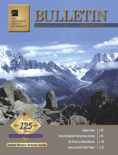
GEOLOGICAL SOCIETY OF AMERICA BULLETIN
Pioneering Insights in Geological Research Since 1890The Geological Society of America Bulletin (GSA Bulletin), with ISSN 0016-7606 and E-ISSN 1943-2674, is a premier scholarly journal published by Geological Society of America, Inc. Based in the United States, this journal has been a cornerstone of geological research since its inception in 1890, making significant contributions to the understanding of Earth sciences over more than a century. Recognized for its rigorous peer-review process, the GSA Bulletin currently holds a prestigious Q1 ranking in Geology, positioning it among the top 14 journals in Earth and Planetary Sciences in terms of Scopus ranking, reflecting the high quality and impact of the research it publishes. Researchers, professionals, and students alike benefit from its comprehensive coverage of geological topics, including sedimentology, volcanology, and paleontology, which supports the advancement of knowledge in the geosciences. While the journal is not open access, it continues to provide a vital platform for innovative research and critical discussions that shape the future of geology.
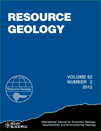
RESOURCE GEOLOGY
Exploring Earth's Riches Through ScienceRESOURCE GEOLOGY, published by WILEY, is a peer-reviewed journal that serves as a vital platform for the dissemination of innovative research in the fields of geology and geochemistry. With an ISSN of 1344-1698 and e-ISSN 1751-3928, the journal has steadily contributed to the academic community since its inception in 1996, continuing through its planned convergence in 2024. With a Q3 ranking in both Geochemistry and Petrology and Geology categories, RESOURCE GEOLOGY is positioned within the competitive landscape of Earth and Planetary Sciences, ranked 164th and 93rd in its respective categories on Scopus, reflecting its significant contribution to the body of knowledge in these fields. While not an open-access journal, it provides access to essential research that advances our understanding of natural resources and geological processes. The journal is dedicated to publishing high-quality articles that appeal to researchers, professionals, and students looking to deepen their insight into the intricate interplay between geological phenomena and resource management.

GEOLOGIA CROATICA
Advancing Earth Sciences Through Open AccessGEOLOGIA CROATICA is a distinguished open-access journal published by the Croatian Geological Survey, dedicated to advancing the field of Earth and planetary sciences. Since its inception in 1992, this peer-reviewed journal has become an essential resource for researchers, professionals, and students interested in various aspects of geology. With its robust impact factor and a prestigious place in Scopus rankings, ranking 127th out of 321 in Geology and 77th out of 159 in miscellaneous Earth and Planetary Sciences as of 2023, GEOLOGIA CROATICA maintains a strong international presence. It provides a platform for the dissemination of critical research findings, promoting collaboration and knowledge sharing among the global scientific community. By focusing on high-quality manuscripts that cover geological processes, hazards, and resources, this journal is pivotal for anyone looking to contribute to or expand their understanding of geological sciences. The journal's commitment to open access ensures that invaluable research is accessible to all, fostering a more informed and scientifically engaged society.
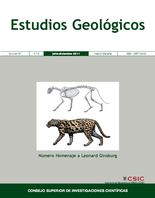
ESTUDIOS GEOLOGICOS-MADRID
Fostering Collaboration in Earth and Planetary Sciences.ESTUDIOS GEOLOGICOS-MADRID is a prominent journal in the field of geology, published by the esteemed Consejo Superior de Investigaciones Científicas (CSIC) in Spain. Established in 1976, this Open Access journal has been a vital resource for researchers and professionals since its inception. With an impact factor reflecting its contribution to the Earth and Planetary Sciences community, ESTUDIOS GEOLOGICOS-MADRID currently holds a Q3 category ranking in Geology as of 2023, showcasing its relevance and quality within the discipline. The journal publishes a diverse array of geological studies, ensuring wide-reaching access to significant research findings, thereby promoting collaboration and knowledge sharing. Established as a platform for both foundational research and applied geology, this journal fosters academic growth and contributes to understanding the Earth’s processes. Researchers, professionals, and students are encouraged to explore its extensive archive, which includes publications from 1976 to the present. For more information, visit the journal's editorial office at Editorial CSIC, C/VITRUVIO 8, 28006 MADRID, SPAIN.
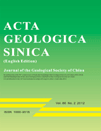
ACTA GEOLOGICA SINICA-ENGLISH EDITION
Connecting Scholars to the Heart of Earth SciencesACTA GEOLOGICA SINICA-ENGLISH EDITION is a distinguished academic journal published by Wiley, providing a platform for cutting-edge research in the field of geology. With an ISSN of 1000-9515 and E-ISSN 1755-6724, this journal has been a pivotal resource since its inception in 1988, catering to scholars and professionals until 2024. The journal is recognized for its high-quality articles, achieving a Q2 ranking in the field of Geology according to the 2023 category quartiles, and ranks #122 out of 321 in the Scopus Earth and Planetary Sciences sector, placing it within the 62nd percentile among its peers. Although currently not available as an open access publication, it remains a significant repository of knowledge that supports ongoing geological research and exploration. For researchers, students, and professionals looking to deepen their understanding of geological sciences, ACTA GEOLOGICA SINICA-ENGLISH EDITION stands as an essential journal, promoting collaboration and innovation in the earth sciences.

GEOSCIENCES JOURNAL
Pioneering Insights into Earth's Complex Systems.Welcome to the GEOSCIENCES JOURNAL, a pivotal publication in the fields of Earth and Planetary Sciences and Environmental Science, proudly presented by the Geological Society of Korea. Established in 1997, this journal has become a prominent platform for researchers, professionals, and students, offering a rich collection of peer-reviewed articles that explore a diverse array of geoscientific topics. With an impressive Q2 ranking in both Earth and Planetary Sciences and Environmental Science categories for 2023, it stands as an essential resource in the academic community. Though it operates under a traditional subscription model, GEOSCIENCES JOURNAL remains dedicated to advancing knowledge through rigorous research. Addressed from its headquarters in Seoul, South Korea, the journal aims to foster a deeper understanding of geosciences, encouraging innovation and collaboration in tackling today’s environmental challenges.

Gondwana Research
Fostering Global Collaboration in Earth SciencesGondwana Research is a premier academic journal published by Elsevier, specializing in the field of geology, with a robust focus on the geological history and processes of the Gondwana supercontinent. With an impressive impact factor and ranking as Q1 in the 2023 Geology category, it stands as a leading platform for disseminating high-quality research. The journal features articles that advance the understanding of Earth and planetary sciences, making significant contributions to geological education and research. Researchers will find its curated content particularly valuable, as it encompasses a wide array of topics including stratigraphy, paleontology, and tectonics, all relevant to both contemporary and historical geological inquiries. Given its substantial reach and esteemed standing—ranked 5th out of 321 in its field—Gondwana Research plays a crucial role in fostering scientific exchange among global experts. Located in the United States with publication continuity from 1997 to 2024, this journal consistently attracts submissions from leading scientists, ensuring that its readership is kept at the forefront of geological discovery and innovation.